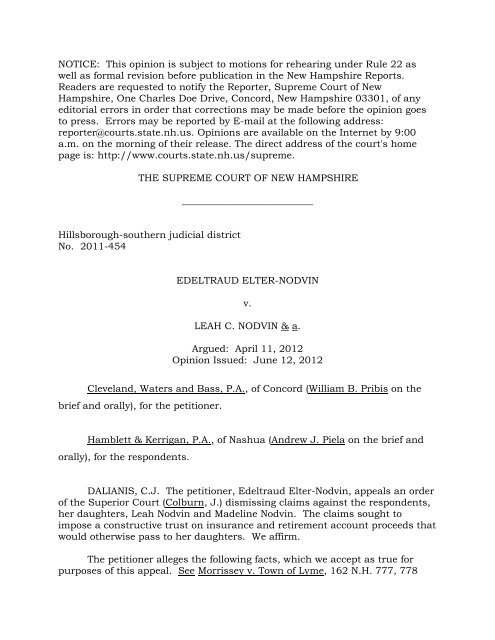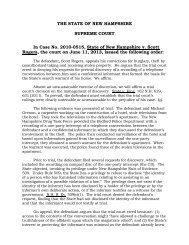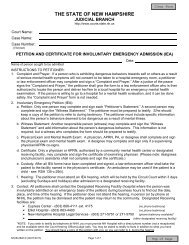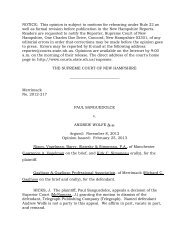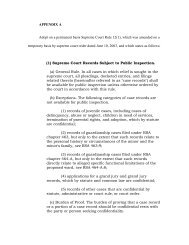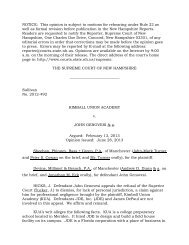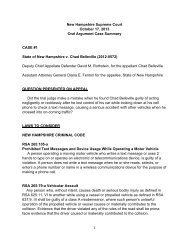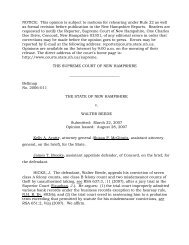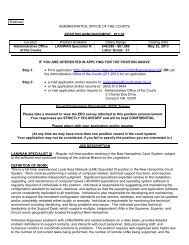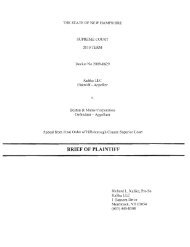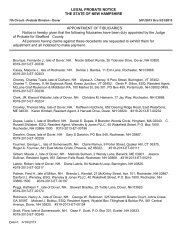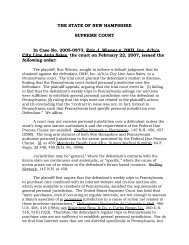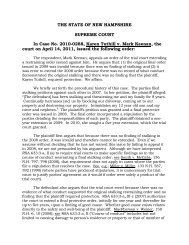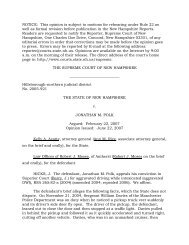EDELTRAUD ELTER-NODVIN v. LEAH C. NODVIN
EDELTRAUD ELTER-NODVIN v. LEAH C. NODVIN
EDELTRAUD ELTER-NODVIN v. LEAH C. NODVIN
Create successful ePaper yourself
Turn your PDF publications into a flip-book with our unique Google optimized e-Paper software.
NOTICE: This opinion is subject to motions for rehearing under Rule 22 as<br />
well as formal revision before publication in the New Hampshire Reports.<br />
Readers are requested to notify the Reporter, Supreme Court of New<br />
Hampshire, One Charles Doe Drive, Concord, New Hampshire 03301, of any<br />
editorial errors in order that corrections may be made before the opinion goes<br />
to press. Errors may be reported by E-mail at the following address:<br />
reporter@courts.state.nh.us. Opinions are available on the Internet by 9:00<br />
a.m. on the morning of their release. The direct address of the court's home<br />
page is: http://www.courts.state.nh.us/supreme.<br />
THE SUPREME COURT OF NEW HAMPSHIRE<br />
Hillsborough-southern judicial district<br />
No. 2011-454<br />
___________________________<br />
<strong>EDELTRAUD</strong> <strong>ELTER</strong>-<strong>NODVIN</strong><br />
v.<br />
<strong>LEAH</strong> C. <strong>NODVIN</strong> & a.<br />
Argued: April 11, 2012<br />
Opinion Issued: June 12, 2012<br />
Cleveland, Waters and Bass, P.A., of Concord (William B. Pribis on the<br />
brief and orally), for the petitioner.<br />
Hamblett & Kerrigan, P.A., of Nashua (Andrew J. Piela on the brief and<br />
orally), for the respondents.<br />
DALIANIS, C.J. The petitioner, Edeltraud Elter-Nodvin, appeals an order<br />
of the Superior Court (Colburn, J.) dismissing claims against the respondents,<br />
her daughters, Leah Nodvin and Madeline Nodvin. The claims sought to<br />
impose a constructive trust on insurance and retirement account proceeds that<br />
would otherwise pass to her daughters. We affirm.<br />
The petitioner alleges the following facts, which we accept as true for<br />
purposes of this appeal. See Morrissey v. Town of Lyme, 162 N.H. 777, 778
(2011). She and Stephen Nodvin were married in 1986. During their marriage,<br />
the couple had two daughters, the respondents herein. In 2009, Stephen filed<br />
for divorce, the couple separated, and the petitioner moved abroad.<br />
In October of that year, the family division issued an anti-hypothecation<br />
order instructing the parties to refrain from, among other things, disposing of<br />
marital property while the proceedings were pending. Sometime thereafter,<br />
Stephen changed the beneficiaries of certain life insurance policies and<br />
retirement accounts from the petitioner to the couple’s daughters. After<br />
changing the beneficiaries, Stephen died.<br />
In February 2011, the petitioner sued her daughters for the insurance<br />
and retirement account proceeds. She argued that the circumstances under<br />
which her husband changed his beneficiaries justified the imposition of a<br />
constructive trust. The daughters, one of whom was still a minor and<br />
represented by her guardians, moved to dismiss the petition. They argued that<br />
Stephen’s change of beneficiaries did not violate the anti-hypothecation order,<br />
and, therefore, their status as the named beneficiaries entitled them to the<br />
proceeds of their father’s insurance policies and retirement accounts. The trial<br />
court dismissed the petition, and the petitioner appealed.<br />
In reviewing this motion to dismiss, our standard of review is whether<br />
the allegations in the petitioner’s pleadings are reasonably susceptible of a<br />
construction that would permit recovery. Tessier v. Rockefeller, 162 N.H. 324,<br />
329 (2011). We assume the pleadings to be true and construe all reasonable<br />
inferences in the light most favorable to the petitioner. Id. at 330. We need not<br />
assume, however, the truth of statements in the pleadings that are merely<br />
conclusions of law. Id. We then engage in a threshold inquiry that tests the<br />
facts in the petition against the applicable law, and if the allegations do not<br />
constitute a basis for legal relief, we must uphold the granting of the motion.<br />
Id.<br />
The petitioner first argues that Stephen’s alleged violation of the antihypothecation<br />
order justifies the imposition of a constructive trust. The order<br />
restrained the parties “from selling, transferring, encumbering, hypothecating,<br />
concealing or in any other manner whatsoever disposing of any property, real<br />
or personal, belonging to either or both of them.”<br />
Here, because the petitioner’s beneficiary status was not “property, real<br />
or personal, belonging to” her, Stephen’s selection of new beneficiaries did not<br />
violate the order. See In the Matter of Goodlander & Tamposi, 161 N.H. 490,<br />
495-96 (2011) (discretionary trust distributions were a “mere expectancy” and<br />
not property subject to equitable division during divorce). “[T]he beneficiary’s<br />
interest in [an insurance] policy does not rise to the level of a vested property<br />
interest unless the insured is somehow prohibited from changing the<br />
2
eneficiary designated in the policy.” Dubois v. Smith, 135 N.H. 50, 59 (1991).<br />
The petitioner has not alleged that anything prohibited Stephen from changing<br />
the beneficiaries of the disputed policies and accounts, and, thus, concedes, as<br />
she must, that she had no vested interest in remaining as the beneficiary.<br />
Accordingly, absent a property interest, Stephen’s action did not violate the<br />
plain language of the anti-hypothecation order.<br />
Nevertheless, the petitioner argues that we should focus upon the order’s<br />
purpose, rather than its letter. The purpose, she contends, was to preserve the<br />
status quo so that the trial court could equitably divide the couple’s assets<br />
during the divorce proceeding. See RSA 458:16-a, I, II (2004). Had divorce<br />
proceedings continued, she argues, the court’s power to distribute marital<br />
property would have permitted it to require Stephen to maintain the nowdisputed<br />
policies for her benefit. See Dubois, 135 N.H. at 52 (provision in<br />
divorce stipulation required party to maintain children as insurance<br />
beneficiaries). As a result, she asserts, Stephen violated the order because,<br />
when he changed his beneficiaries, he interfered with the trial court’s ability to<br />
make such a distribution in the proceedings that were to come. See<br />
Northwestern Mut. Life Ins. Co. v. Hahn, 713 N.W.2d 709, 711-12 (Iowa Ct.<br />
App. 2006).<br />
Even if, for the sake of argument, we adopt the petitioner’s construction<br />
of the order, we reject her conclusion. Stephen’s nomination of different<br />
beneficiaries in no way impaired the trial court’s ability to order him to name a<br />
particular beneficiary in the divorce proceedings. See Dubois, 135 N.H. at 52.<br />
Rather, the court lost its ability to make such an order because Stephen died,<br />
not because he changed beneficiaries. His change of beneficiaries, by itself, did<br />
not impair the court’s ability to make orders relating to the disputed policies.<br />
Thus, even under the petitioner’s interpretation, Stephen’s actions did not<br />
violate the anti-hypothecation order and, therefore, cannot serve as the basis<br />
for imposing a constructive trust.<br />
The petitioner next argues that equity requires the imposition of a<br />
constructive trust on the insurance proceeds. No rigid requirements exist for<br />
imposing a constructive trust. In re Estate of Cass, 143 N.H. 57, 60 (1998). A<br />
constructive trust may be imposed when clear and convincing evidence shows<br />
that a confidential relationship existed between two people, that one of them<br />
transferred property to the other, and that the person receiving the property<br />
would be unjustly enriched by retaining the property, regardless of whether the<br />
person obtained the property honestly. Id. A confidential relationship exists if<br />
there is evidence of a family relationship in which one person justifiably<br />
believes that the other will act in his or her interest. Id.<br />
In this case, the trial court properly dismissed the petitioner’s<br />
constructive trust claim because she failed to allege facts establishing a<br />
3
confidential relationship at the time Stephen changed beneficiaries. An<br />
essential component of a confidential relationship is the justifiable belief that a<br />
person will act in another’s best interest. See id. The petitioner argues that<br />
she had such a relationship with Stephen because, during their marriage, the<br />
couple agreed to purchase life insurance with marital assets. Her petition<br />
alleges that the couple bought insurance to “ensure that[,] were one to<br />
predecease the other, the surviving spouse would be protected financially,” and<br />
that the couple spent “substantial amounts of marital funds on . . . life<br />
insurance premiums[,] [m]uch” of which the petitioner earned.<br />
These allegations fail to establish a confidential relationship, however,<br />
because, notwithstanding the couple’s marital plans to provide for one another<br />
at death, Stephen’s filing for divorce notified the petitioner that his plans had<br />
changed. At that point, the petitioner’s alleged belief that Stephen would<br />
continue to act in her best interest by following through with the couple’s<br />
existing estate plan became unreasonable. Cf. Boyd v. Boyd, 67 S.W.3d 398,<br />
405 (Tex. App. 2002) (“The fiduciary duty arising from the marriage<br />
relationship does not continue when a husband and wife each hire<br />
independent professional counsel to represent them in a contested divorce<br />
proceeding.”). Indeed, one purpose of divorce is to equitably redistribute the<br />
marital assets. See RSA 458:16-a, II. As a result, when Stephen requested a<br />
divorce, he unequivocally signaled his desire to have the court redistribute the<br />
couple’s assets rather than abide by whatever plans were in place prior to the<br />
divorce filing. Given this significant change in the couple’s relationship, the<br />
petitioner could not have justifiably believed that Stephen would continue to<br />
provide for her through life insurance.<br />
Thus, while their divorce action was pending, the petitioner could not<br />
rely upon Stephen to provide for her based upon a spousal obligation. Rather,<br />
if she wished to remain beneficiary of the insurance policies, she should have<br />
asked the court to order Stephen not to alter them. See RSA 458:16 (2004). In<br />
the absence of such an order or some other legal or equitable obligation to<br />
maintain the policies for the petitioner, Stephen was free to name his<br />
daughters as beneficiaries. See Dubois, 135 N.H. at 58 (“[I]f an insurance<br />
policy so provides, the insured may change the designated beneficiary of the<br />
policy at any time, provided that the insured has not contracted away this<br />
right.”). Because the petitioner failed to allege facts giving rise to a justifiable<br />
belief that Stephen would act in her best interest, her petition lacks facts<br />
establishing a confidential relationship. Therefore, she cannot obtain the relief<br />
of a constructive trust, and the trial court properly dismissed her claim. See In<br />
re Estate of Cass, 143 N.H. at 60.<br />
Finally, the petitioner contends that the trial court erred when it<br />
dismissed her breach of contract claim. We first note that the petitioner failed<br />
to allege a breach of contract claim in her petition. Instead, she included a<br />
4
footnote in her objection to the respondents’ motion to dismiss requesting to<br />
amend her petition by adding a breach of contract claim.<br />
The trial court’s order dismissing the petition made no mention of this<br />
claim, which we construe as a denial of the petitioner’s request to amend<br />
rather than a substantive ruling upon the claim. The claim’s absence from the<br />
dismissal order suggests that the trial court either declined to allow the<br />
amendment and, therefore, found it unnecessary to address the contract<br />
claim’s substance, or did not address the petitioner’s request because she<br />
failed to file a motion seeking to amend. Such a construction renders the<br />
dismissal order internally consistent and avoids the questionable assumption<br />
that the trial court impliedly granted the petitioner’s request to amend and<br />
then dismissed the contract claim substantively without analysis or comment.<br />
Cf. In the Matter of Salesky & Salesky, 157 N.H. 698, 709 (2008) (“[W]e must<br />
assume that the trial court made all findings necessary to support its<br />
decision.”). As the petitioner does not argue that the trial court should have<br />
permitted her amendment or erred by declining to address a request set out in<br />
a footnote to an objection, we affirm the court’s decision. Waterfield v.<br />
Meredith Corp., 161 N.H. 707, 713 (2011) (issues not briefed are deemed<br />
waived).<br />
HICKS, CONBOY and LYNN, JJ., concurred.<br />
5<br />
Affirmed.


